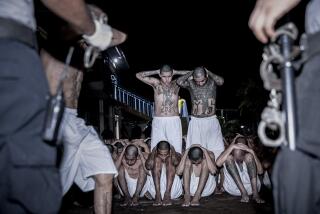Rights Abuse Increase Reported in Guatemala
- Share via
MIAMI — Guatemalan government forces are responsible for a serious increase in human rights abuses, including “hundreds of political killings, disappearances and attempted assassinations” since the start of 1988, according to a leading human rights organization.
In a report released today, the New York-based Americas Watch said that from Jan. 1 to Sept. 30, at least 621 people have died in politically related assassinations in the Central American nation, most of them at the hands of government military and security forces.
These figures indicate a rate of killing considerably lower than that attributed to the government during the 20-year period ending in 1986--when an estimated 100,000 Guatemalans were killed and another 38,000 “disappeared.” However, Americas Watch said the current “available statistics indicate a significant increase in disappearances and killings attributable to government forces in 1987-88, compared with the two previous years.”
United Nations Report
For instance, the U.N. Commission on Human Rights reported at the end of 1987 that a minimum of 172 people in Guatemala had been killed or had disappeared at the hands of government agents between January, 1986, and October, 1987.
Americas Watch, a nonpartisan group with a reputation among Western journalists for integrity and careful research, also noted that, given the difficulty in compiling reliable statistics, the real total of abuses so far this year could be considerably higher.
The earlier human rights violations came at a time when Guatemala was faced with a serious guerrilla movement. The military dictatorship that ruled the country in the 20 years starting in 1966 employed a “total war” concept that not only destroyed the insurrection but led to international condemnation and a halt to nearly all American military aid.
The situation improved temporarily in January, 1986, according to the report, when Vinicio Cerezo Arevalo, a long-time Christian Democratic politician and foe of the military regime, was sworn in as the nation’s first democratically elected president since 1970.
“Yet,” the Americas Watch report says, “more than halfway through President Cerezo’s five-year term, there has been little improvement in Guatemala’s human rights record; the military has ceded no authority to civilians in rural areas, and rights violators among the military have not been brought to justice.”
The report attributes Cerezo’s inability to curb the human rights abuses to his concern over losing office in a military coup, an assessment generally shared by foreign reporters covering Guatemala.
What little independent authority the president held appeared to have been effectively removed last May when senior army officers supported him against a coup attempt by young officers backed by conservative business elements. In exchange, Cerezo reportedly gave in to a series of demands from the military that left him little more than a figurehead.
Americas Watch also was critical of the government’s judicial response to the alleged violations, saying that an amnesty program was ill-advised because it excused previous criminal acts and that judges currently do little to punish more recent abuses.
In addition, the report states, the four agencies that Cerezo created to monitor human rights activities do little more than shuffle papers “rather than promoting investigation and prosecution of human rights violations.”
The report also levels severe criticism at the U.S. government for allegedly “whitewashing” Guatemala’s human rights record.
“Statistics on political killings provided by the U.S. Embassy routinely discount the possibility of violence by government forces, attributing it instead to guerrillas, unknown assailants and right-wing death squads,” it says.
The Reagan Administration is now preparing to resume military and police aid, as much as $18 million for 1988 and 1989. The aid is motivated, the report states, “by a desire to keep a civilian president in office in Guatemala.”
In addition, Congress provided Guatemala with more than $108 million in economic and development assistance in 1988, with $114 million more approved for next year.
“In our view,” the report says, “this aid is not warranted by the human rights performance of the Guatemalan military and security forces . . . Under Section 502 (B) of the Foreign Assistance Act, military aid is to be barred from governments which engage in a consistent pattern of gross violations of human rights.”
More to Read
Sign up for Essential California
The most important California stories and recommendations in your inbox every morning.
You may occasionally receive promotional content from the Los Angeles Times.










